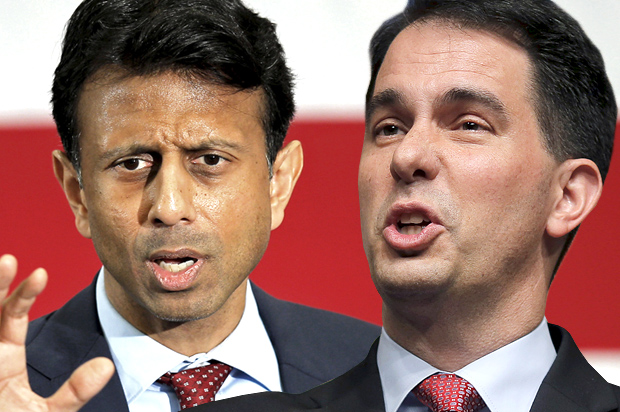Scott Walker has been falling hard in the most recent polls of must-win-for-him Iowa as likely caucus-goers have awakened to the fact that he’s about as dynamic as a kitchen table. That was earlier, though. Walker has just released a sleek, PDF’d plan to repeal and replace Obamacare, and this should solve all of his problems. Or, more likely, add new ones.
Thrown into his replacement plan are all of the usual conservative health care ideas: slash-and-block-granting Medicaid, selling insurance across state lines, expanding HSAs, tort reform, high-risk pools. And then there’s a mechanism to guarantee coverage for those with pre-existing conditions “[p]rovided individuals maintain continuous, creditable coverage.” In other words, sick people, let your insurance lapse for even a month, and good luck ever getting health insurance again. (A lot of people let their insurance lapse from time to time.)
The meat of Walker’s plan, though, addresses those individuals who don’t get health insurance through their employer. Under Obamacare, individuals purchase plans on regulated exchanges and receive premium tax credits pegged to income level. Walker’s plan would also offer tax credits for individuals, but they would be tied to age, not income. That’s a more administratively efficient means of disbursing tax credits than basing them off of income levels: you fall in a certain age range and get X amount of dollars, and there’s the end of your paperwork. But it’s also too blunt. A wealthy 30-year-old and a poor 30-year-old would each receive the same subsidy — and that subsidy might not be enough for the poor 30-year-old to bother purchasing health insurance.
Tax credits cost money, though, and conservatives don’t like spending government money to help people with things like their health. Walker’s plan pledges not to offset a dime of these outlays with new taxes. As best we can tell by reading this paper, Walker intends to fund the tens or hundreds of billions of dollars in tax credits through cuts to Medicaid and caps on employer-sponsored health benefits (the latter of which — a conservative idea — is already in Obamacare.)
The costs associated with my plan would not be funded through new taxes and mandates. In fact, my plan would repeal all of ObamaCare’s $1 trillion in new taxes and provide new tax cuts. To offset these improvements, we would simplify and reform how the federal government helps people access health insurance. We would empower states to run Medicaid in a 12 way that is more effective, efficient, and accountable, and work with Congress to reform the way the tax code treats goldplated, employer-sponsored health care plans.
Walker’s plan is a mosaic of most other conservative “replacement” plans that wouldn’t cover as many people as Obamacare does and introduces assorted other problems that come with insurance market deregulation. But it’s enough, at least, to win an approving nod of the head from Reformicon wonks. “[T]his one sets the bar for conservative health reform very high, in both substantive and political terms,” National Review’s Yuval Levin writes. “Let’s hope more candidates reach that high.”
The plan most certainly does not win the approval of a certain desperate, go-nowhere candidate by the name of Bobby Jindal. In a statement, Jindal slammed Walker for putting forth a plan that spends money to help people afford health insurance — something that cannot be tolerated if America is ever to recover her glorious freedoms.
In Governor Walker’s plan, a new entitlement is created for every single American human being from the time they are born right up until they grow old and become eligible for Medicare. It is frankly shocking that a Republican candidate for President would author a cradle to grave plan like this.
Governor Walker has taken the bait laid out for him by the President, and has accepted the notion that we need a new federal government entitlement program, and now he is merely quibbling over the details. So here we are again, not standing on free market principles, but rather, establishing ourselves as “cheaper Democrats.” . . . Surely we as Republicans have more courage than this.
Jindal goes on to call Walker’s plan “Obamacare lite,” and also asks, dramatically, “When did conservatism die?” Ha! Good q.
Jindal’s stance that issuing tax credits to help people purchase health insurance is some sort of communist devilry unfortunately exposes him to his own past. Before Bobby Jindal transformed himself into a cranky conservative firebrand in an effort to position himself for the White House (how’s that working?), he was considered a reasonable conservative policy wonk with impeccable academic credentials. And as National Review’s Ramesh Ponnuru points out, Jindal, between 2008 and 2013, was a vocal advocate of expanding access to medical coverage through refundable tax credits. He was a strong supporter of John McCain’s 2008 health plan, which would have unwound the employer-sponsored health insurance system and given everyone a refundable tax credit with which to purchase insurance.
But hey, that was before Bobby Jindal determined that it would be politically advantageous in a long-shot presidential bid to attack tax credits from the right.
No one cares about Bobby Jindal so his protestations may not get very far. If this complaint takes root with the Republican primary field, though, that’s serious bad news for Republican efforts to repeal and replace Obamacare. Millions of individuals would lose health insurance coverage if Obamacare is repealed, and if Republicans want to cover their hides, they’re going to have offer something broad enough to help a sizable chunk of those people. That’s going to cost money. If the very concept of subsidizing health insurance becomes taboo by the end of this intra-candidate rush to the right, then it’s going to make it very hard for Republicans to settle on a politically viable plan to replace Obamacare if they’re able to unify control of the federal government.

